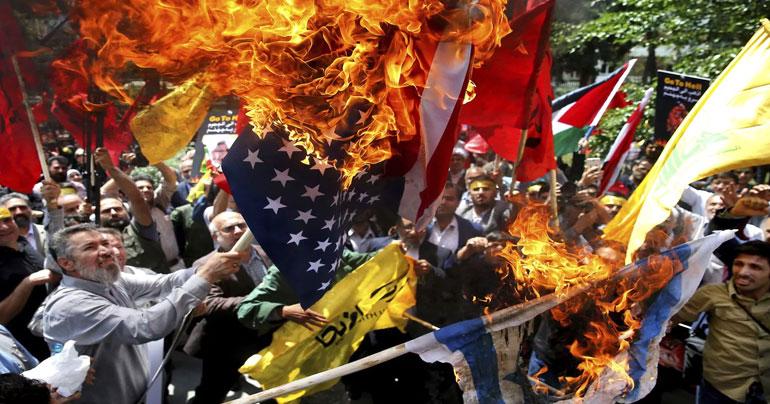Trump’s ’recklessness’ spurs jitters in the Middle East
BEIRUT — President Trump’s moves to open a new Jerusalem embassy and withdraw from the Iran nuclear deal are destabilizing an already volatile Middle East, risking a wider regional war that the United States will be unable or unwilling to contain.
Scenes of the bloodshed in Gaza have been twinned on television screens across the Arab world this week with footage of presidential advisers Ivanka Trump and Jared Kushner celebrating at the U.S. Embassy in Jerusalem, reigniting forgotten Arab sympathies with the plight of the Palestinians and implicating the United States in the violence.
Trump’s decision to pull out of the Iran nuclear deal days earlier had already triggered concerns among friends and foes alike that he is steaming ahead in making major policy shifts without a coherent strategy for addressing the fallout.
Either one of these steps would have rocked the region, but both coming in the space of less than a week amounted to “a recklessness that is frightening,” said Bruce Riedel of the Brookings Institution in Washington.
With the Arab-Israeli peace process at a dead end and wars already raging in Syria, Yemen and Libya, “the Middle East is already a dangerous enough environment,” he said. “The last thing we needed was very provocative moves that only add further toward the momentum towards an even larger regional confrontation.”
In the space of eight days, election results in Iraq and Lebanon dealt setbacks to U.S. political allies in places where the United States competes for influence with Iran, and the biggest confrontation yet between Israel and Iran erupted in Syria and the Golan Heights. All of this added to the sense that the Middle East is hurtling toward some new form of upheaval.
These events all run counter to U.S. interests by strengthening hard-liners in Iran, undermining the United States’ Arab allies, fueling passions that can lead to extremism and ceding ground to rivals such as Russia, said Riad Kahwaji of the Dubai-based Inegma defense consultancy.
“Iran, Russia, ISIS, al-Qaeda — you are playing into the hands of all the U.S. enemies in the region,” he said. ISIS is another name for the Islamic State.
Even the closest U.S. allies in the Persian Gulf are growing uncomfortable with Trump’s policies, which they increasingly suspect are rooted more in his desire to fulfill election promises to his domestic base than in any alignment with these countries’ interests, regional analysts say.
Although Saudi Arabia and the United Arab Emirates publicly welcomed Trump’s decision last week to withdraw from the nuclear deal, officials in those countries have privately expressed misgivings about the apparent lack of any alternative strategy for containing Iran, the analysts say. The rulers of Saudi Arabia and the
UAE have energetically cultivated close personal relationships with the Trump family but are starting to realize that their close ties to the president could backfire.
Saudi Arabia and its allies had vociferously opposed the nuclear deal because it failed to address their concerns about Iran’s ballistic missile program and its expansionist activities in the region. But these countries didn’t expect Trump to withdraw from the accord without a replacement strategy that would address their foremost concerns, he said.
The Trump administration has yet to fully articulate its Iran strategy, but the U.S. president indicated in his statement announcing the withdrawal from the deal that his approach will rely on sanctions to curb Iran’s behavior. Alani said that could take years.
“The time frame is not encouraging because we don’t think Trump can achieve the objective of Iran containment in two years,” he said. “We are 100 percent with this policy, but what is this containment going to be, what is our role, and are you going to put us on the front line?”
The Gulf countries had agreed that the deal was too weak to stop Iran’s nuclear development, Alani said, “But we needed amendment, not cancellation. We need some sort of deal. We don’t want war.”
The feeling that Trump is undermining his allies was compounded by the opening of the Jerusalem embassy on Monday, which thrust images of Israelis killing Palestinians back into the Middle East media for the first time in years and revived memories of an era when the United States was seen as the foremost enemy of Arab aspirations.
“These are the policies of one president. He will go, another will come, and we will be left to face the music in the region,” said Mustafa Alani, director of security studies at the Gulf Research Center in the Saudi capital, Riyadh.
“The Massacre of Trump’s Declaration” read a headline in the pan-Arab Al-Hayat, making it clear who the newspaper blamed for the deaths of 60 Palestinians by Israeli gunfire.
“Trump was beginning to have momentum vis-a-vis Iran with the support of the other Arab countries, but after Gaza, it’s like he’s someone shooting himself in the foot,” said Kahwaji. “When we have scenes like we saw in Gaza, Iran gains more popularity because Iran is the one advocating resistance against Israel.”
These developments could put Arab allies of the United States “in a weak spot,” Kahwaji said. “At some point they will have to distance themselves from the Trump administration.”
Most ordinary Arabs in the region see Trump’s moves simply as “bizarre,” said Rami Khouri, a professor at the American University of Beirut.
“The United States posture has shifted into a very unusual, predatory, chest-thumping bravado, and we’re seeing the results in the ratcheting-up of tensions,” he said. “But then they don’t take any action.”
Khouri said he doubts there will be a major war because the costs would be too high for everyone involved, and Trump has clearly indicated he does not want to engage the United States in military action. Instead, continuing flare-ups and skirmishes are likely, he said.
But the risk remains that a miscalculation or unforeseen incident could ignite a larger conflict. Debates rage over which front line might become the next flash point.
The most obvious one is Syria, where Israel and Iran are already locked in a cycle of escalating confrontations. An Israel-Iran clash in Syria could draw in Lebanon, where Iran’s ally Hezbollah has recently cemented its hold on Lebanese politics with a narrow election win by its allies over the U.S.-backed bloc led by Prime Minister Saad Hariri.
Yemen is another potential flash point. A big worry is that one of the missiles now being fired by Iran-backed Houthi rebels at Riyadh will cause mass casualties or hit a facility such as the airport terminal and kill Americans, necessitating a U.S. response, said Firas Maksad, director of the Arabia Foundation, which is based in Washington and backed by Saudi Arabia.
The outcome of the election in Iraq, meanwhile, has brought Iraq into play by delivering the largest number of seats in the country’s parliament to the mercurial cleric Moqtada al-Sadr and relegating the U.S.-backed Prime Minister Haidar al-Abadi to third place, according to unofficial results.
Sadr is opposed to both the United States and Iran, both of which have a military presence in Iraq. According to the latest figures made available by the Pentagon, as of December, 5,200 U.S. troops were based there, coexisting alongside Iranian military advisers and Iranian-backed militias under a detente that took hold during the Obama administration.
But Sadr’s win was narrow, and he will need allies if his bloc is to lead the next government, setting up a contest between Iran and the United States to influence its shape. That competition could turn violent.
“The most dangerous place is probably Iraq, because we have a substantial American presence in Iraq, and the Iranians have many proxies,” said the Brookings Institution’s Riedel. “The election has put the future of the country very much up in the air. I’d be worried that Iranian proxies will start targeting American soldiers, as they have done before, and then we’re in a very shaky situation.”
Share This Post






